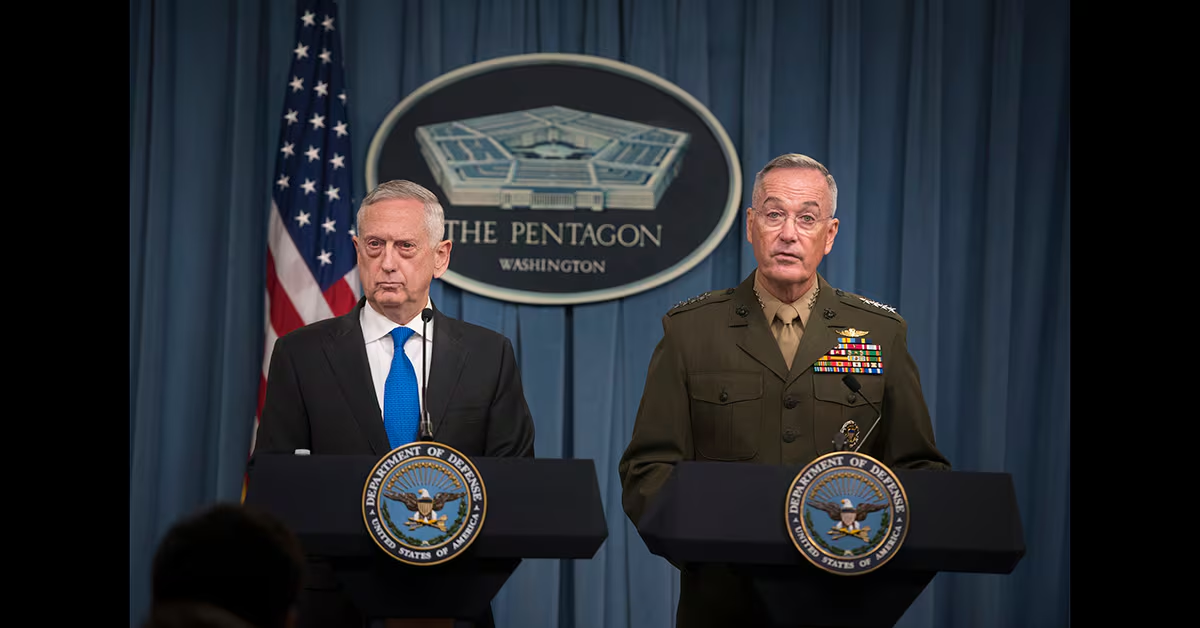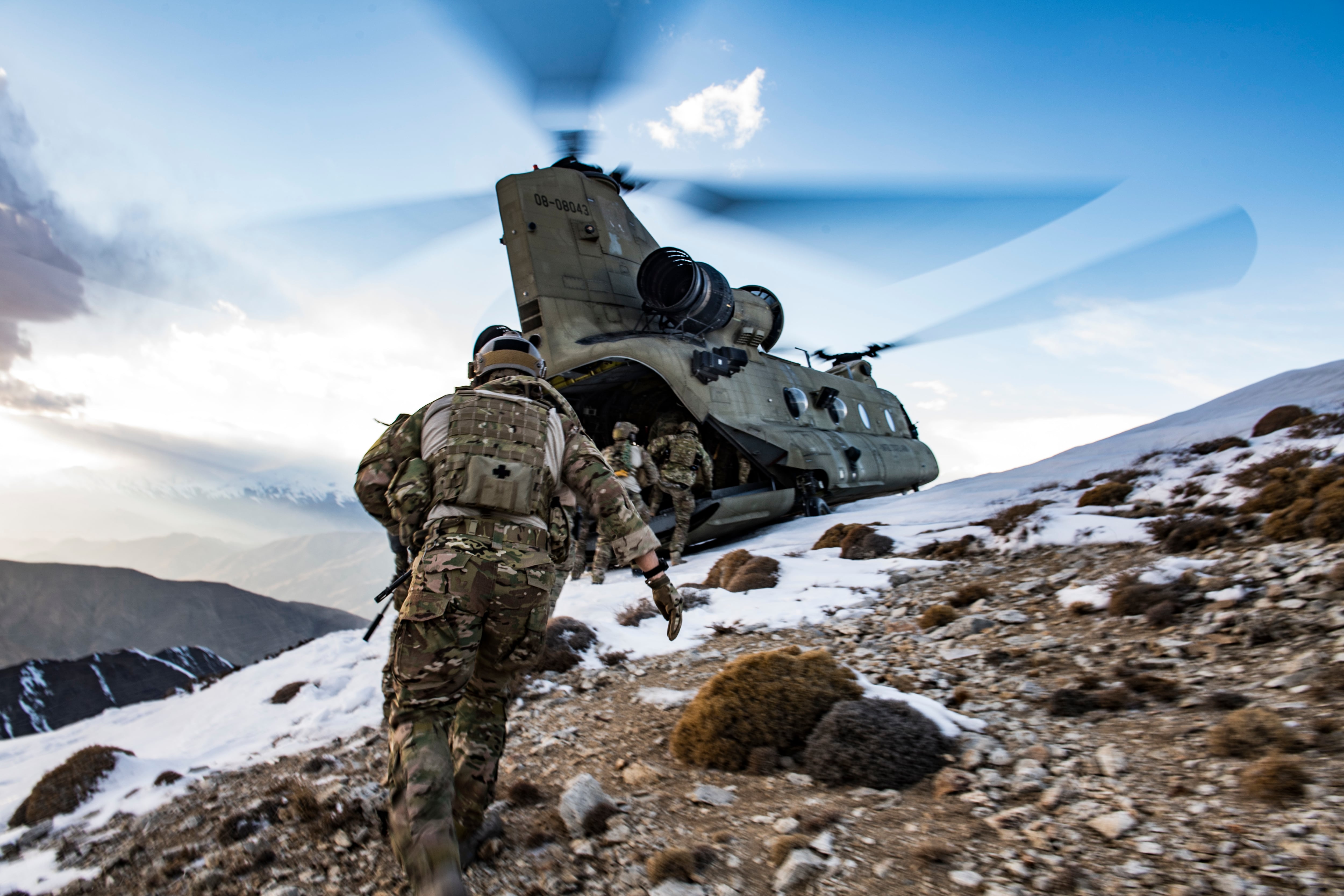Blackwater founder Erik Prince thinks the time is right to try a new approach in Afghanistan, one that he says will reduce war spending to a sliver of its current levels, get most troops home and eliminate Pakistan’s influence on U.S. policy there: Let him run it.
In an exclusive interview with Military Times, Prince shared new details about his proposed force and why he believes a small footprint of private military contractors and even smaller footprint of U.S. special operators may be able to accomplish what hundreds of thousands of U.S. troops and NATO forces over the last 17 years could not.
Prince first presented the idea as President Donald Trump took office last year, hoping that the president’s long-stated opposition to keeping U.S. forces in Afghanistan would open the door to a privatized presence.
But Trump listened to his national security team instead, including critics of the plan like Defense Secretary Jim Mattis, former Secretary of State Rex Tillerson and former National Security Adviser H.R. McMaster.

Now, more than a year later, Prince senses opportunity again. McMaster and Tillerson are no longer working for the White House; Mattis' ability to influence the president seems to have waned and new National Security Adviser John Bolton told ABC News this month he’s “always open to new ideas.”
“When I floated this idea last year a lot of people shot it down,” Prince told Military Times, referring to his initial pitch as Trump took office. “I floated it again this year, because I know even days after [Trump] made the decision [to extend the U.S. mission in Afghanistan] last year, how reluctant he was to make that decision.”
RELATED

Mattis remains opposed to a privatized force and was blunt in his criticism when asked about it by Military Times at a Pentagon press briefing last week.
“When Americans put their nation’s credibility on the line, privatizing it is probably not a wise idea,” Mattis said.
Nevertheless, Prince is undeterred. He suspects that interest in his plan at the White House will grow as senior national security staff remaining from McMaster’s days depart and new staff under Bolton increase their sway.
Prince also thinks that, ultimately, cost savings might convince the president to try something new. Prince said his plan would cost $5 billion a year, a fraction of what it currently costs the U.S. to operate in Afghanistan.
The U.S. government estimates that the 9/11 attacks, which originated in Afghanistan, cost Osama bin Laden $500,000 to plan. Since the U.S. responded in October 2001, U.S. taxpayers have spent $753 billion in war operations, based on a 2017 defense department assessment; $126 billion in reconstruction, based on SIGAR’s most recent audit; and about $45 billion each for continued operations in 2018 and 2019. Total cost to date: almost $1 trillion.
Or as Prince puts it, “$1 billion a week to infinity.”

“Every day the U.S. has to keep that many forces in Afghanistan is another day OBL wins,” he said, referring to Bin Laden.
The basics of Prince’s plan:
- Swap out the people: There are 23,000 multinational forces in Afghanistan (including about 15,000 Americans and about 8,000 NATO-member country forces) and about 27,000 DoD-supporting contractors. Prince wants to replace them with a smaller footprint of 6,000 contractors and 2,000 active-duty U.S. special operations forces. The 6,000 contractors would be made up of 60 percent former U.S. special operations forces and 40 percent former NATO special operations forces. The NATO forces, Prince said, “would come as individuals not from a NATO unit, thus they would not be hampered by the myriad of national restrictions on each NATO country.”
- No more NATO mission: Prince would not say if he had discussed his plan with other NATO-member countries, but his force would serve as a replacement for the NATO forces on the ground as well. “The idea of our concept is to provide an embedded structural support to the ANSF, making all conventional forces redundant,” Prince said.
- Command and control: The 2,000 U.S. special operations forces that would augment the 6,000 contractors “would remain the lead element and provide the U.S. unilateral direct-action capabilities and provide quality assurance over any contracted elements,” Prince said.
- No rotations: Those contractors would stay with their Afghan units, instead of moving in and out in a more typical military deployment cycle. Those contractors “would be retained for the long term, at least three years minimum,” Prince said. “Typical 90 days on, 30 off rotations going back to the same unit and same geography each time.”
- A private air force: About 2,000 of Prince’s contractors would be there to operate a fleet of medevac, close air support and helicopter air assets and run two western-style combat surgical hospitals that would also treat wounded Afghan soldiers.
- A fraction of the cost: Prince said he can execute this mission on a budget of roughly $5.5 billion. Specifically, $3.5 billion for the contractors, aircraft, warehouses for logistics and the field hospitals; about $2 billion for the 2,000 U.S. special operations forces.
- What accountability? The contractors and military forces would both be subject to the Uniform Code of Military Justice and Afghan law. Each aircraft would also have an Afghan crew member who would be the one to fire munitions, not the contractor. “Contractors serving as adjunct in the Afghan forces under Afghan [rules of engagement] would be accountable for any misconduct under the UCMJ,” Prince said. “A JAG element, similar to what’s assigned now for U.S. Forces, would have jurisdiction over the U.S. and foreign contracted personnel. Any investigations and trials would be conducted in Afghanistan. Any incarceration would be by their home country of citizenship or U.S. as acceptable,” Prince said.
- What about long-term care in case of injury? The contractors would be covered by Defense Base Act insurance, which covers the costs of full medical treatment, evacuation and lost wages. Military personnel would be cared for under the VA.
RELATED

Even with the attractiveness of a far cheaper price tag, Prince’s name is forever tied to Blackwater USA, the former private security company he founded in 1997. And Blackwater’s reputation from Iraq may become the No. 1 reason Prince’s Afghanistan proposal is so far finding fewer supporters.
In 2004 the State Department found itself ill-prepared to provide full security for the rapidly growing population of diplomats in Baghdad operating under the Coalition Provisional Authority. The State Department selected Blackwater that year to fill gaps in its Worldwide Protective Services Contract, with an initial award of $106 million, according to a State Department inspector general’s audit. By 2009, Blackwater had been paid more than $1.35 billion for security services in Iraq.
Blackwater quickly became a symbol of what government watchdogs said was out-of-control war spending. Contractors were criticized for acting as if they were above Iraqi law. Blackwater convoys ran Iraqi civilian drivers off the roads and frequently used machine gun fire as a default warning when locals got too close. Their behavior angered and alienated the local population, even as some of the U.S. ground forces came to rely on Blackwater in gun battles where additional military assets could not respond.
Then came Nisoor Square. On Sept. 16, 2007, after several previous hostile engagements that day, Blackwater contractors fired on a crowd of Iraqi civilians, killing 17. The Iraqi government ordered the security firm out of the country. The State Department ended Blackwater’s contract the next year. Some former employees involved in that shooting incident remain in jail, awaiting sentencing in the U.S courts.
RELATED

Prince said that incident was not representative of the whole firm, and said layers of bureaucracy by the State Department and specific requirements for movements, such as requiring four vehicles, “brand-new Suburbans washed and waxed that morning” to drive in every convoy — instead of lower-profile local vehicles that would blend in — added to the tension the firm encountered and generated in Iraq.
“For the media to define a company by one event is probably not fair,” Prince told Military Times, saying the Nisoor Square incident was the most-reported civilian casualty event of the war. Prince points to data collected by the non-profit Iraq Body Count, which estimates that at least 180,000 Iraqi civilians have been killed since the U.S. launched Operation Iraqi Freedom in 2003 — and more than 92,000 of those occurred after the 2007 Blackwater incident.
Since the Nisoor Square shooting, Blackwater has changed its name at least twice and is now known as Academi.
RELATED

Even if it’s not named Blackwater anymore, the idea of contracting out U.S. war policy gives some Afghanistan experts cause for concern.
“I think its a recipe for corruption. I think it’s a recipe for potential for human rights or other abuses by forces on the ground because they are not government forces,” said Seth Jones, a former plans officer and adviser to the commanding general, U.S. Special Operations Forces, in Afghanistan who is now a senior adviser at the Center for Strategic and International Security.
“When I’ve looked at successful counterinsurgency campaigns since World War II, I see almost no cases of governments essentially contracting out significant parts of a war effort,” Jones said.
Prince says Afghanistan would be different. When out in the field, each contractor would have a body camera, which he said would be made readily available to the Defense Department if an event required further military investigation under the UCMJ.
“Certainly we’ll put body cameras on guys because we’ll certainly have ‘shoot/no shoot’ events that come into question,” he said.
There would be no more black Suburban convoys either. Each contractor — whom he calls “mentors" — would be embedded with Afghan units and stay with those same units, on the same terrain, in an Afghan uniform, vehicles and subject to both the UCMJ and Afghan law, they would not rotate out, instead they would spend several years with the same units.
Prince also envisions being able to sharply reduce the logistical support and costs, not only by having a smaller force that needs less, but by finally addressing what has been one of the costliest parts of the war: fuel. Through 2008 to 2016 alone, U.S. forces in Afghanistan consumed 2.8 billion gallons of fuel, at a cost of $13 billion.
Prince said he would build two on-site refineries that could turn regular diesel into jet fuel, saving millions on having to truck it in through Pakistan. He estimates it would cost $150 million to build the refineries.
“We’ve been spending a fortune flying in, and trucking in, jet fuel,” Prince said. By taking that approach, he said it could also free the U.S. from some of its reliance on Pakistan, which happens to be one of the president’s goals as well.
RELATED

Since Trump announced the South Asia Strategy last August, he’s remained largely quiet on the issue. He’s only tweeted twice on Afghanistan this year, both times in January, according to the twitter archive Fact Base. One tweet attacked Pakistan for its role in destabilizing Afghanistan; the other lamented Afghan police officer deaths after an attack in Kabul. The silence could be viewed as a signal that Trump is satisfied for now; however in a July 2018 press conference in Brussels, he left the door open for additional change.
“When is the war going to end in Afghanistan?,” a BBC reporter asked. “Because people are fed up and want to know.”
“I very much agree,” Trump said. "It’s been going on for a long time. We’ve made a lot of progress, but it’s been going on for a long time. "
Prince, a former Navy SEAL, estimates that in the 17 years U.S. forces have been on the ground in Afghanistan there’s probably 30 or more major unit turnovers, sending seasoned soldiers home and replacing them with new, unfamiliar forces who had to relearn routes, threats and re-establish relationships with local Afghan leaders.
“I would call repeating that insanity for the 31st or 32nd time unwise,” Prince said. “The president rightly campaigned on ending our endless wars,” Prince said. “He has an opportunity to do it.”
Tara Copp is a Pentagon correspondent for the Associated Press. She was previously Pentagon bureau chief for Sightline Media Group.




